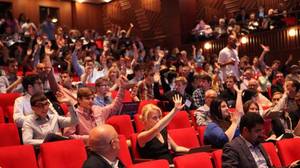Future Now
The IFTF Blog
Applying the Goldilocks Strategy—From Personal Democracy to Global Governance
How can you know whether you are changing the world? Are you mistaking vanity metrics for impact?

Taren Stinebrickner-Kauffman from SomeOfUs.org asked the audience just these questions during her brief talk at Personal Democracy Forum in New York City. She described the need to set the focus of a campaign on important goals—not too big to deem impossible (or where never reaching a goal keeps you in business) or too small to offer little serious learning. And with those right-sized goals in mind, test your real impact, with evidence!
At a conference that ranges in attendance from seasoned political and social campaigners to tech-enthusiasts of all varieties, it felt important to think about a strategy worthy of every project. The Goldilocks metaphor was echoed differently by Singularity University’s Salim Ismail’s talk on Government in an Age of Phase Change, which pointed out the vaporization of domains by technology, including moving from hardware to software to the cloud. Applying this phase change to government he asked, how do we have stable structures in a vapor state? Rather than the “hot air” of Occupy Wall Street, the Arab Spring, and the Tea Party movement, what are bottom up substantive and stable structures that can change governance?
At the Governance Futures Lab our sights are set on finding and cultivating social inventors and their novel governance designs. While reaching a billion such inventors over the next decade is a very big (and important) goal, there are smaller, more achievable goals that mark the road to a billion: creating a toolkit to foster design thinking, collaborating with partners who are prototyping new models to examine the future, and working on technology that enables civic participation.
While I left the Personal Democracy Forum invigorated by the ideas and passions of some of the most daring activists and entrepreneurs, I also sensed the parallel that Goldilocks brings to our current age of human responsibility and planetary challenges. While we test the impact we have on the world through our projects, we should be wary of waiting for a “just right” opportunity at the expense of acting. Likewise, we should avoid sabotaging the opportunities for those who follow on our efforts, fostering an open and collaborative environment for technological and societal development in the new structures we build.
Photo: Esty Stein / Personal Democracy Media



